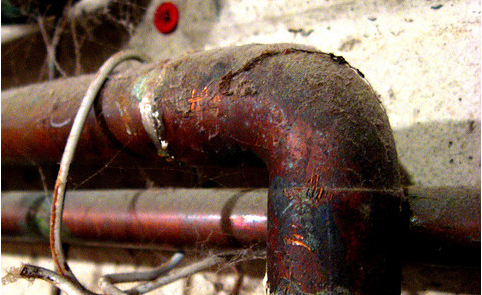How To Keep Your Pipes From Bursting This Winter
Baby — may I call you baby? — it’s cold outside in many places across America right now. It’s not just you that needs to keep warm, either: If you don’t want your home’s pipes to shatter from the cold and leave you without water and with a hefty plumber’s bill, you’ll want to do a few things to help ward against icy water pipes.
Our benevolent overlords at Consumer Reports have covered this before and the advice still stands. It’s important to keep the ice that may form in your pipes from creating a bunch of water from bottling up in the blockage and putting huge pressure on the pipes, causing them to crack, spring leaks or straight out burst.
Especially if you live in the South, where homes aren’t always insulated from cold temperatures due to how buildings there are constructed, it’s important to make sure you take care of any exposed pipes.
First of all — how do you know if you have a frozen pipe? You can often tell if a faucet or appliance isn’t getting water. If you turn on your sink and the water isn’t flowing, a temporary solution is to allow the faucet to drip slowly. An ice blockage might already be in place, but this drip takes the pressure off and might keep that pipe from bursting.
Even if the slow drip stops, keep the faucet on to release pressure.
“You want the smallest drip rate that will provide pressure relief. A slow trickle is overkill; just make sure there is a consistent dripping,” Bill Rose, a research architect at the University of Illinois’ Building Research Center told Consumer Reports. “If you have a single-lever faucet setting, provide pressure relief to hot and cold pipes by leaving the setting in the middle so water can drip out from both the hot and cold water supply pipes.”
To help your pipes, the below tips should go a long way toward preventing a big chill:
1. Turn off water to outside spigots — and don’t leave hoses attached to them in the winter.
2. Insulate your pipes if you live anywhere north of the Rio Grande. So, basically everywhere. You can cover pipes with insulation or warm up pipes prone to freezing with electric heat tape.
“Often we think of putting insulation on the pipe to protect it from the freezing air on the outside; this does have an effect, but the water must be able to give off heat to become ice,” Rose says. “Insulation can delay this process and prevent ruptures.”
3. Don’t turn your heat off totally when you go on vacation — leave it at about 55 degrees Fahrenheit. This is a broad rule, Rose adds, and might not work in all homes. For example, a house with a basement is good to go, but not one with a crawlspace. Call your plumber for his or her advice before you leave town. It could be good to fully drain your system if you’ll be gone for a long time.
Want more consumer news? Visit our parent organization, Consumer Reports, for the latest on scams, recalls, and other consumer issues.


